Executive assistants are the backbone of an organization, providing essential support to top executives and ensuring smooth operations. They handle a wide range of tasks, from managing schedules and communications to coordinating meetings and travel arrangements.
The skills required for an executive assistant role include proficiency in office software, strong organizational abilities, and excellent communication skills. Additionally, they must be adept at problem-solving and maintaining confidentiality.
Candidates can write these abilities in their resumes, but you can’t verify them without on-the-job Executive Assistant skill tests.
In this post, we will explore 9 essential Executive Assistant skills, 11 secondary skills and how to assess them so you can make informed hiring decisions.
Table of contents
9 fundamental Executive Assistant skills and traits
The best skills for Executive Assistants include Time Management, Communication, Organizational Skills, Tech Savvy, Problem Solving, Attention to Detail, Confidentiality, Multitasking and Adaptability.
Let’s dive into the details by examining the 9 essential skills of a Executive Assistant.
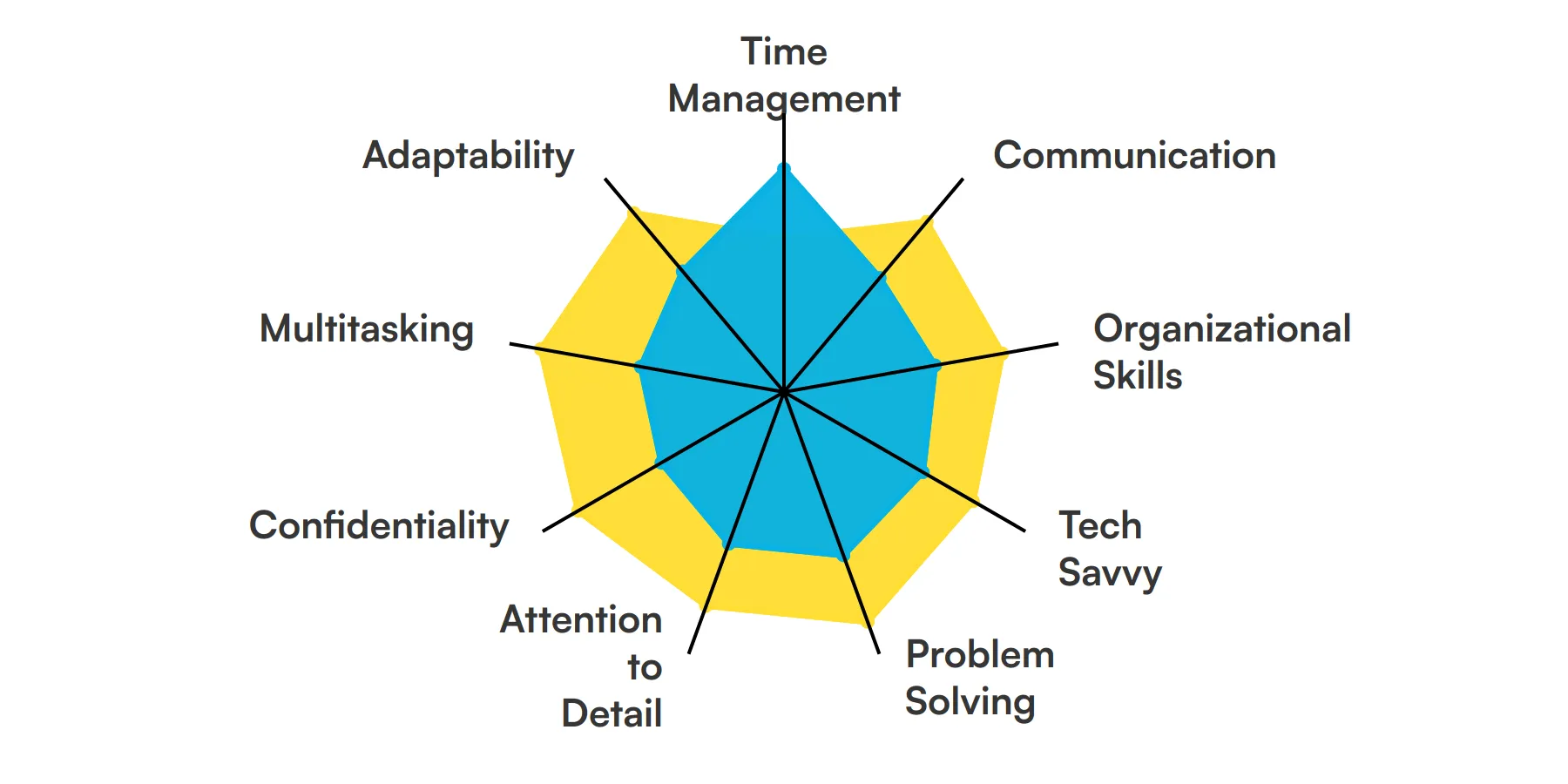
Time Management
An executive assistant must juggle multiple tasks and deadlines. Effective time management ensures that all responsibilities are handled promptly, keeping the executive's schedule on track.
Communication
Clear and concise communication is key for an executive assistant. Whether it's drafting emails, making phone calls, or coordinating meetings, strong communication skills help in conveying information accurately.
For more insights, check out our guide to writing a Communications Manager Job Description.
Organizational Skills
Keeping files, documents, and schedules in order is a daily task for an executive assistant. Organizational skills help in maintaining a clutter-free workspace and ensuring that important information is easily accessible.
Tech Savvy
Proficiency with office software and tools is a must. From managing calendars to creating presentations, being tech-savvy allows an executive assistant to streamline tasks and improve efficiency.
Problem Solving
Unexpected issues can arise at any time. An executive assistant needs to think on their feet and come up with quick, effective solutions to keep things running smoothly.
Attention to Detail
Small errors can lead to big problems. Attention to detail ensures that all tasks are completed accurately, from scheduling meetings to preparing reports.
Check out our guide for a comprehensive list of interview questions.
Confidentiality
Handling sensitive information is a regular part of the job. Maintaining confidentiality is crucial to protect the executive's privacy and the company's interests.
Multitasking
An executive assistant often has to handle several tasks simultaneously. Multitasking skills help in managing these responsibilities without compromising on quality or deadlines.
Adaptability
The role of an executive assistant can be unpredictable. Being adaptable allows them to handle sudden changes and new challenges effectively.
11 secondary Executive Assistant skills and traits
The best skills for Executive Assistants include Event Planning, Travel Coordination, Research Abilities, Financial Management, Customer Service, Project Management, Writing Skills, Interpersonal Skills, Negotiation Skills, Cultural Awareness and Presentation Skills.
Let’s dive into the details by examining the 11 secondary skills of a Executive Assistant.
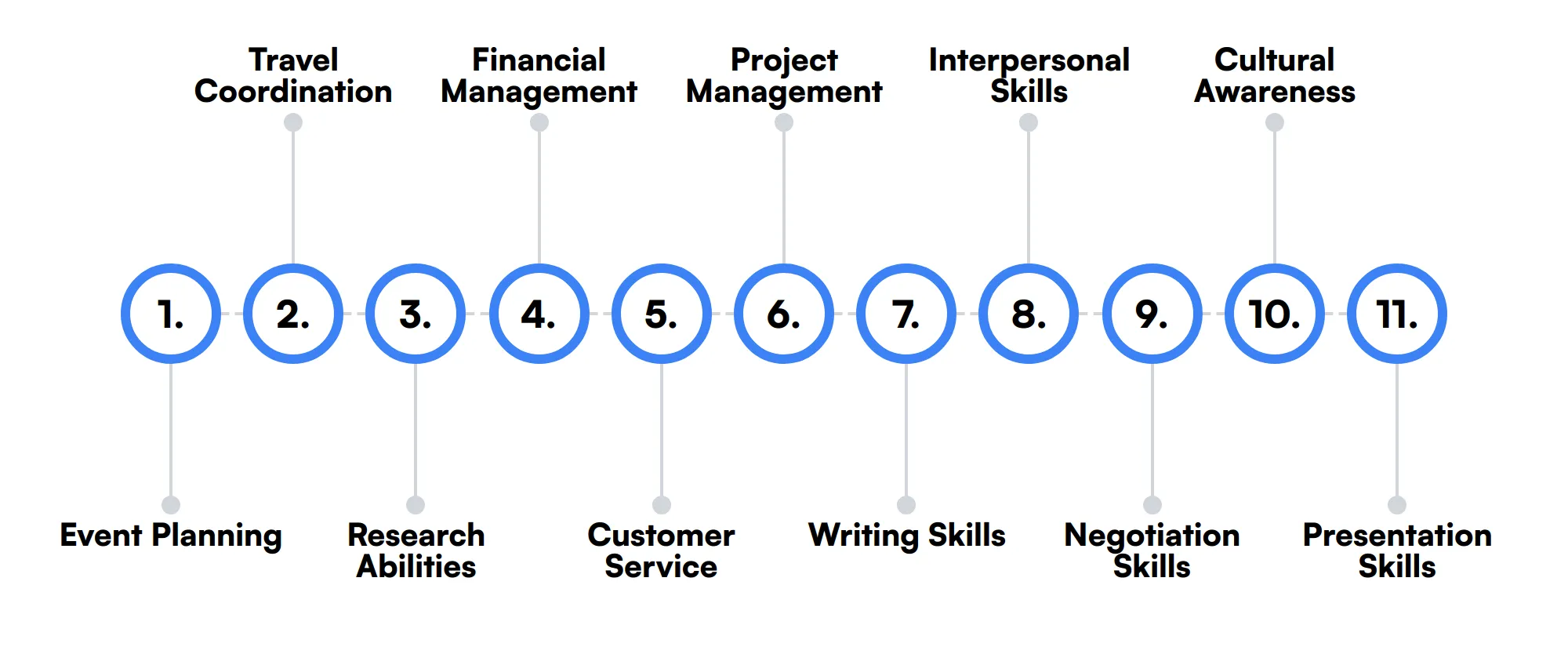
Event Planning
Organizing events, from small meetings to large conferences, can be part of the job. Event planning skills ensure that everything runs smoothly and meets the executive's expectations.
Travel Coordination
Booking flights, hotels, and transportation requires meticulous planning. Travel coordination skills help in arranging seamless travel experiences for the executive.
Research Abilities
Conducting research on various topics can be necessary for preparing reports or presentations. Strong research abilities help in gathering accurate and relevant information.
Financial Management
Managing budgets, expenses, and financial reports can be part of the role. Financial management skills ensure that all financial aspects are handled efficiently.
Customer Service
Interacting with clients and stakeholders is a regular task. Good customer service skills help in building positive relationships and representing the executive professionally.
Project Management
Overseeing projects from start to finish requires strong project management skills. This ensures that all tasks are completed on time and meet the desired outcomes.
Writing Skills
Drafting emails, reports, and other documents requires clear and effective writing. Good writing skills help in communicating information accurately and professionally.
Interpersonal Skills
Building and maintaining relationships with colleagues, clients, and stakeholders is important. Strong interpersonal skills help in creating a positive work environment.
Negotiation Skills
Whether it's negotiating contracts or resolving conflicts, negotiation skills are valuable. They help in achieving favorable outcomes for the executive and the organization.
Cultural Awareness
Working in a diverse environment requires an understanding of different cultures. Cultural awareness helps in interacting respectfully and effectively with people from various backgrounds.
Presentation Skills
Creating and delivering presentations can be part of the job. Good presentation skills help in conveying information clearly and engagingly.
How to assess Executive Assistant skills and traits
Assessing the skills and traits of an Executive Assistant can be a nuanced process. It's not just about what they know, but how they apply their knowledge in real-world scenarios. From time management to adaptability, each skill plays a significant role in their daily responsibilities. Understanding how to evaluate these skills effectively is key to finding the right fit for your organization.
Traditional resumes and interviews often fall short in providing a complete picture of a candidate's abilities. They might list impressive qualifications, but they don't always reveal how well the candidate can manage time, communicate, or solve problems under pressure. This is where skills-based assessments come into play. By using targeted evaluations, you can gain deeper insights into a candidate's true capabilities.
For a comprehensive evaluation, consider leveraging tools like Adaface assessments. These assessments can help you achieve a 2x improved quality of hires by focusing on real-world skills and scenarios. Whether it's organizational skills, tech-savviness, or attention to detail, Adaface provides a structured way to measure these critical traits, ensuring you make informed hiring decisions.
Let’s look at how to assess Executive Assistant skills with these 5 talent assessments.
Administrative Assistant Test
The Administrative Assistant Test evaluates a candidate's skills and aptitude for the role of an administrative assistant. It covers organizational skills, time management, communication skills, attention to detail, problem-solving, and proficiency in using office software.
The test includes scenario-based questions to assess how a candidate would handle specific situations, such as managing schedules, handling correspondence, and dealing with confidential information. It also evaluates their ability to follow instructions and maintain attention to detail.
Successful candidates demonstrate strong organizational and time management skills, effective communication, and the ability to solve problems efficiently. They also show proficiency in using office software and handling various administrative tasks.
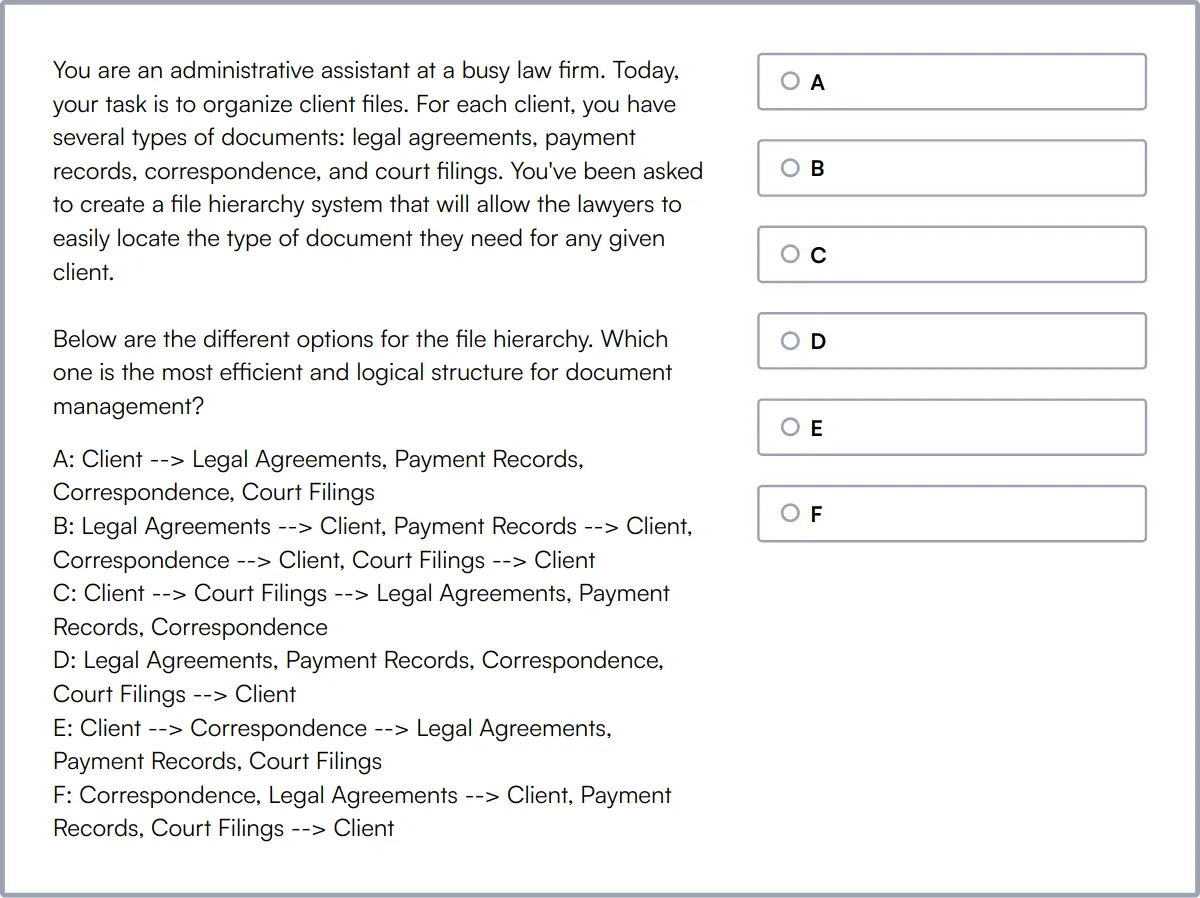
Communication Skills Test
The Communication Skills Test evaluates candidates' communication skills, including verbal and written communication, active listening, and interpersonal skills. It is designed to assess their ability to effectively communicate with customers, colleagues, and stakeholders in various professional scenarios.
The test covers situational judgement, attention to detail, critical thinking, and verbal reasoning. It includes questions that assess how candidates handle different communication scenarios, ensuring they can convey information clearly and effectively.
High-scoring candidates demonstrate strong verbal and written communication skills, critical thinking, and the ability to make sound judgements in various situations. They also show attention to detail and the ability to reason verbally.
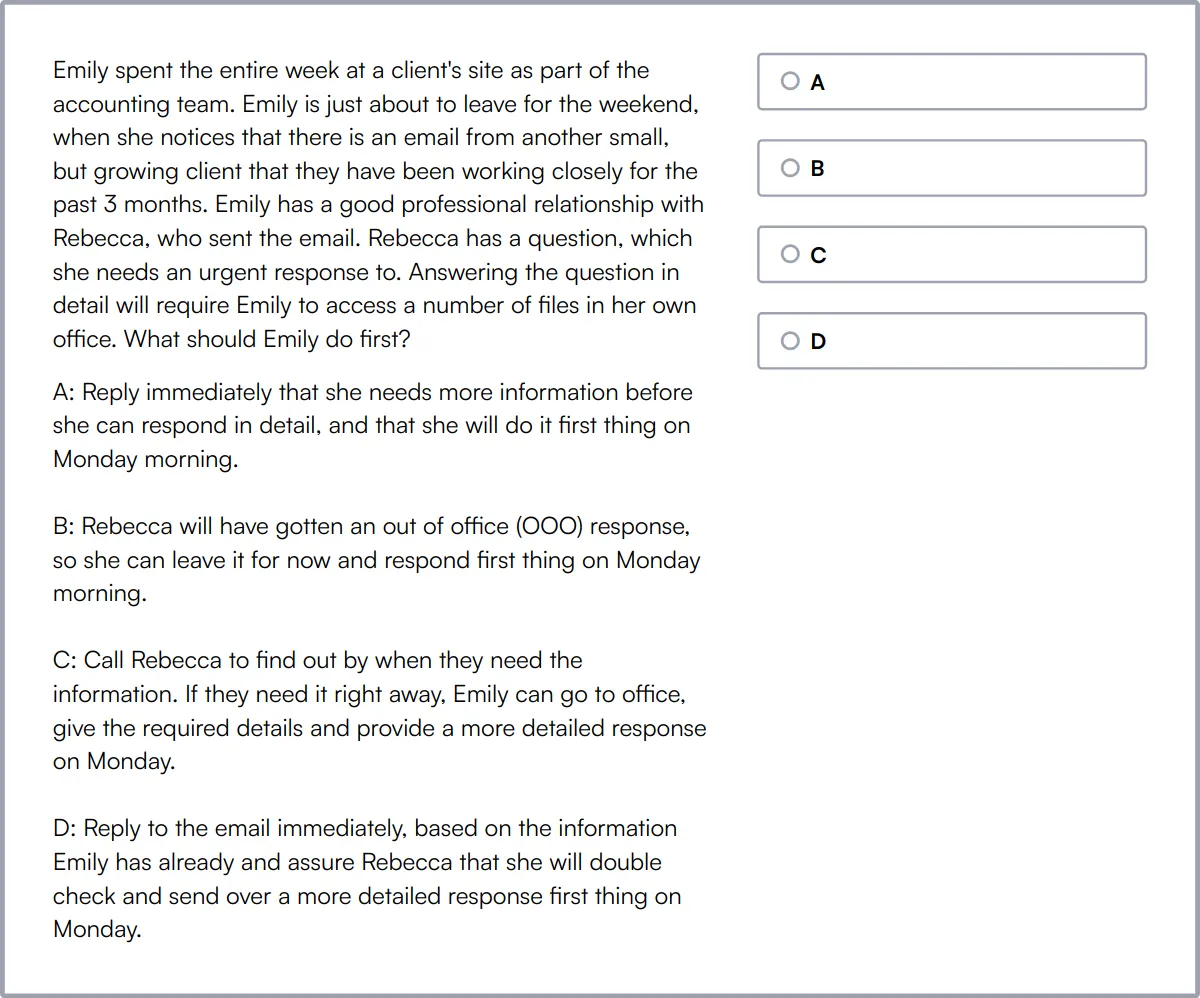
Basic Computer Skills Test
The Basic Computer Skills Test evaluates a candidate's knowledge of fundamental computer skills, including data entry, Excel, typing, and system administration.
The test assesses their ability to perform basic computer tasks, such as data entry, using Excel for data analysis, and typing efficiently. It also evaluates their understanding of system administration and basic programming concepts.
Candidates who perform well on this test demonstrate proficiency in essential computer skills, including data entry, Excel, and typing. They also show a basic understanding of system administration and programming concepts.
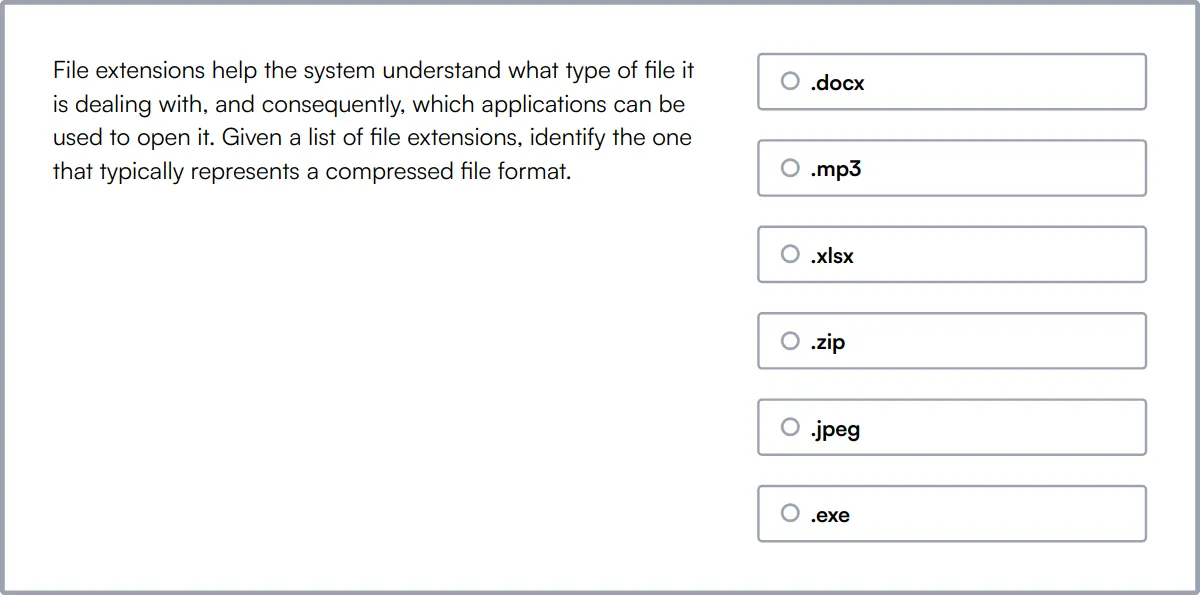
Problem Solving Test
The Problem Solving Test evaluates a candidate's ability to understand instructions, analyze data, and respond to complex problems or situations. It covers abstract reasoning, critical thinking, deductive reasoning, inductive reasoning, pattern matching, and spatial reasoning.
The test includes questions that assess a candidate's problem-solving skills, learning agility, and coachability. It evaluates their ability to interpret data, recognize patterns, and apply logical reasoning to solve problems.
Successful candidates demonstrate strong problem-solving skills, critical thinking, and the ability to reason both deductively and inductively. They also show proficiency in recognizing patterns and spatial reasoning.
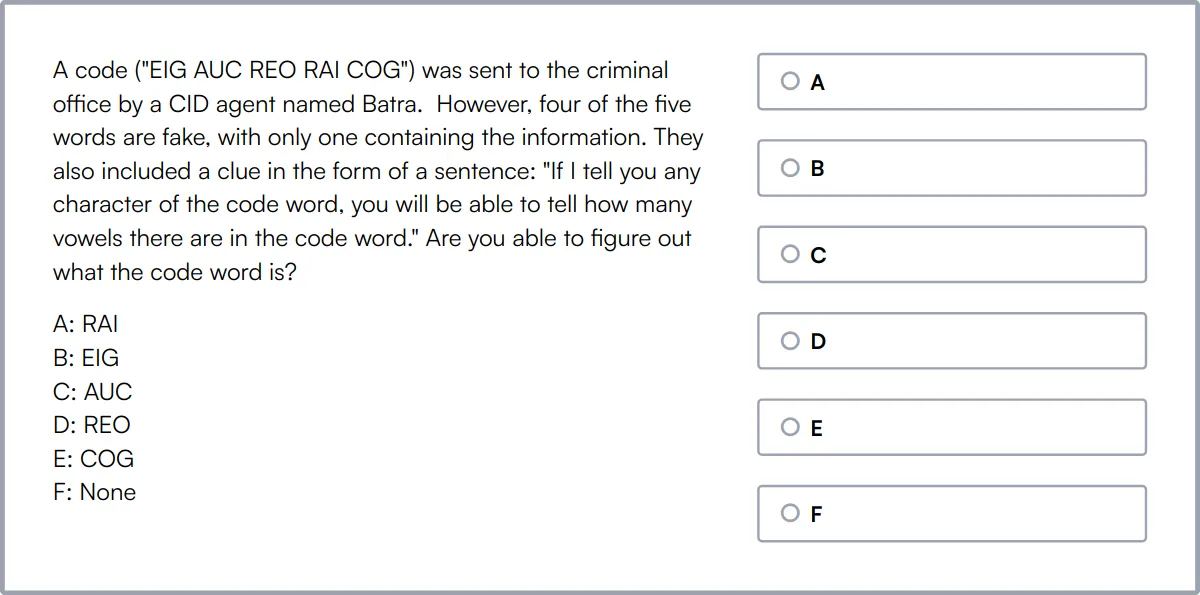
Attention To Detail Test
The Attention to Detail Test evaluates a candidate's ability to focus on tasks and their willingness to be thorough for detail-oriented work. It covers following instructions, verifying data, checking consistency, proof-reading, identifying mistakes, and detecting typos.
The test assesses a candidate's ability to process information accurately and ensure high-quality work. It includes questions that evaluate their attention to detail, ability to follow instructions, and skill in identifying errors and inconsistencies.
Candidates who excel in this test demonstrate a keen eye for detail, the ability to follow instructions accurately, and proficiency in identifying and correcting errors. They ensure high-quality work by maintaining consistency and accuracy.
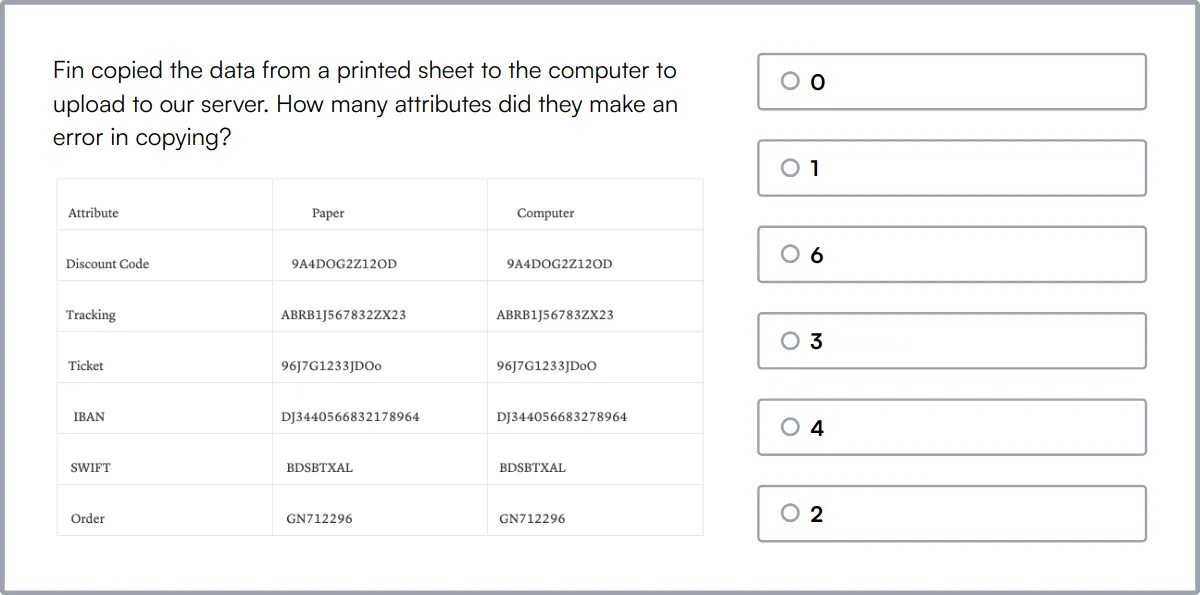
Summary: The 9 key Executive Assistant skills and how to test for them
| Executive Assistant skill | How to assess them |
|---|---|
| 1. Time Management | Evaluate how effectively a candidate prioritizes and allocates time for tasks. |
| 2. Communication | Assess clarity, conciseness, and effectiveness in verbal and written exchanges. |
| 3. Organizational Skills | Observe ability to maintain systems and processes for efficient workflow. |
| 4. Tech Savvy | Test proficiency with office software, tools, and technological trends. |
| 5. Problem Solving | Present scenarios to evaluate creative solutions and decision-making processes. |
| 6. Attention to Detail | Check accuracy and thoroughness in completing tasks and managing information. |
| 7. Confidentiality | Discuss hypotheticals to judge understanding and handling of sensitive information. |
| 8. Multitasking | Simulate a multi-faceted task environment to observe handling and prioritization. |
| 9. Adaptability | Challenge with unexpected changes to see flexibility and response quality. |
Administrative Assistant Test
Executive Assistant skills FAQs
How can I assess an Executive Assistant's time management skills?
Ask candidates to describe a time they managed multiple deadlines. Look for specific strategies they used to prioritize tasks and stay organized.
What are key indicators of strong communication skills in an Executive Assistant?
Evaluate their clarity and professionalism in both written and verbal communication during the interview. Request examples of how they handled complex communication tasks.
How do I test an Executive Assistant's tech-savviness?
Inquire about their experience with office software like Microsoft Office, Google Workspace, and project management tools. Consider a practical test to gauge their proficiency.
What questions can reveal an Executive Assistant's problem-solving abilities?
Ask about a challenging situation they faced and how they resolved it. Look for logical thinking, creativity, and resourcefulness in their response.
How important is confidentiality for an Executive Assistant, and how can I assess it?
Confidentiality is critical. Ask candidates about their experience handling sensitive information and their approach to maintaining discretion.
What are effective ways to evaluate an Executive Assistant's multitasking skills?
Discuss scenarios where they had to juggle multiple responsibilities. Look for examples that demonstrate their ability to manage several tasks without compromising quality.
How can I determine if an Executive Assistant has strong organizational skills?
Ask about their methods for keeping track of tasks, appointments, and documents. Look for structured and systematic approaches in their answers.
What should I look for in an Executive Assistant's event planning experience?
Request examples of events they have planned, including the scope and complexity. Assess their ability to manage logistics, coordinate with vendors, and handle unexpected issues.

40 min skill tests.
No trick questions.
Accurate shortlisting.
We make it easy for you to find the best candidates in your pipeline with a 40 min skills test.
Try for freeRelated posts
Free resources



